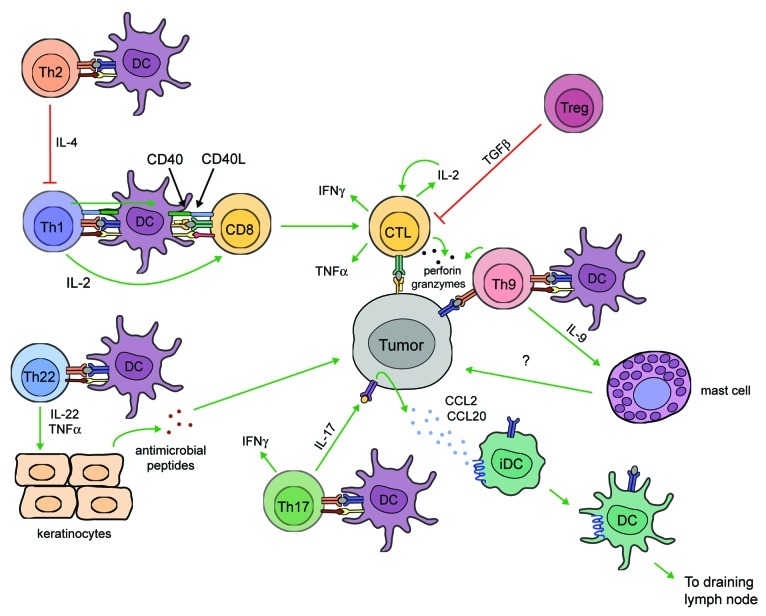Figure 2. Functional T-cell populations in tumor immunity. Antitumor T-cell functions. Cytotoxic CD8+ T lymphocytes (CTLs) directly kill tumor cells by releasing cytotoxic granules containing perforin and granzymes and secrete interleukin (IL)-2, interferon (IFN)γ, and tumor necrosis factor (TNF)α, which contribute to antitumor functions in several ways. IL-2 promotes CD8+ cell survival and proliferation. IFNγ enhances CD4+ TH1 cell differentiation, inhibits angiogenesis, and activates antitumor biochemical pathways in macrophages and dendritic cells (DCs) (not shown). TNFα directly induces tumor cell death and promotes CD8+ cell proliferation and recruitment. CD4+ TH1 cells promote antitumor responses by secreting IL-2 and IFNγ and prime DCs to activate CD8+ T cells through CD40-CD40 ligand (CD40L) interactions. TH17 cells secrete IFNγ and IL-17, the latter of which induces tumor cells to release CCL2 and CCL20, which promote DC recruitment to tumor tissues. DCs bearing tumor antigens migrate to draining lymph nodes and activate tumor-specific CD8+ T cells. In mice, TH9 cells directly kill tumor cells through the release of granzymes and secrete IL-9, which promotes antitumor responses through an unknown mechanism that involves mast cells. TH22 cells secrete IL-22 and TNFα, which activates keratinocytes to produce antimicrobial peptides that exhibit antitumor activity. Pro-tumor T-cell functions. TH2 cells facilitate tumor growth by inhibiting the functions of TH1 cells. Naturally occurring regulatory T cells expressing CD25 and FOXP3 also promote tumor cell growth by suppressing the proliferation and activation of effector T cells.

An official website of the United States government
Here's how you know
Official websites use .gov
A
.gov website belongs to an official
government organization in the United States.
Secure .gov websites use HTTPS
A lock (
) or https:// means you've safely
connected to the .gov website. Share sensitive
information only on official, secure websites.
